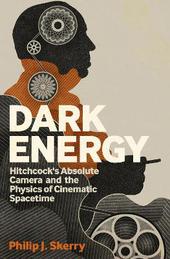
|
Dark Energy: Hitchcock's Absolute Camera and the Physics of Cinematic Spacetime
Paperback / softback
Main Details
| Title |
Dark Energy: Hitchcock's Absolute Camera and the Physics of Cinematic Spacetime
|
| Authors and Contributors |
By (author) Philip J. Skerry
|
| Physical Properties |
| Format:Paperback / softback | | Pages:208 | | Dimensions(mm): Height 229,Width 152 |
|
| Category/Genre | Film theory and criticism
Individual film directors and film-makers |
|---|
| ISBN/Barcode |
9781441189455
|
| Classifications | Dewey:791.43092 |
|---|
| Audience | | Undergraduate | | Postgraduate, Research & Scholarly | |
|---|
|
Publishing Details |
| Publisher |
Bloomsbury Publishing Plc
|
| Imprint |
Bloomsbury Academic USA
|
| Publication Date |
29 August 2013 |
| Publication Country |
United States
|
Description
Alfred Hitchcock and the cinema grew up together. Born in 1899, four years after the first 'official' film showing in Paris, Hitchcock demonstrated an early fascination with the new art of the cinema. He entered the film industry in 1920, and by 1925, he had directed his first feature-length film, The Pleasure Garden. His subsequent film career paralleled the phenomenal growth of the film industry during the years 1925-1976, the year of his last film. In the same way, Hitchcock's films are consonant with the revolutionary theories in the fields of physics and cosmology that were transforming the twentieth century, personified by the genius of Albert Einstein. Philip Skerry's book applies the theories of dark energy, entropy, black holes, and quantum mechanics to Hitchcock's technological genius and camera aesthetics, helping to explain the concept of 'pure cinema' and providing verification for its remarkable power. Including interviews with influential physicists, this study opens up new ways of analyzing Hitchcock's art.
Author Biography
Philip J. Skerry is Professor Emeritus at Lakeland Community College, Ohio, USA, and is the author of Psycho in the Shower: The History of Cinema's Most Famous Scene (2009), as well as numerous articles for scholarly journals. He lives with his wife Amy, a therapist, in Beachwood, Ohio, USA.
ReviewsIn the end, Dark Energy has the considerable virtue of raising questions not only about the value of the particular scientific analogies he develops but of the value of argument by analogy in general. * Hitchcock Annual * Throughout the book, Skerry's enthusiasm is obvious, both for Hitchcock and for popular cosmology. Aficionados of Hitchcock will find new language with which to marvel, and those humanists with an interest in physics will find inviting ways to engage landmark theories of the last century. -- Anthony Collamati, Alma College, US * Cinema Journal * To link Einstein with cinema and Hitchcock with modern physics is a daring experiment, and works on many levels. It is delightful for a physicist (and Hitchcock fan) to see terms like spacetime, antimatter, dark energy, black hole, entropy, etc. turn up as metaphors in a Hitchcock study. A thoroughly enjoyable read. -- Nandor Bokor, Lecturer in the Department of Physics, Budapest University of Technology and Economics, Hungary The 20th Century scientific theories of relativity, quantum mechanics and cosmology substantially changed the way we view the world. In interweaving these revolutions and their implications with the concurrent emergence of moving images as the predominant means of cultural expression, exemplified by their arguably greatest artist and innovator, Phil Skerry does much more than find a fresh angle on the depth in light and dark, the order and chaos in Hitchcock's visual storytelling. Always careful to emphasize that his approach implies the application of universal scientific truths only as metaphors to the most comprehensive (and, as Skerry argues, indeed spatiotemporal art form), he yet paints a bigger and most intriguing picture on how the 20th century zeitgeist was shaped through seeing the world differently, both in science and cinema. A most engrossing read, admirably aiming to bridge the regrettable modern gap between sciences and arts, via the genius of the likes of Einstein and Hitchcock, and finding nothing less than philosophy therein. -- Ulrich Ruedel, Conservation Technology Manager at British Film Institute National Archive, UK
|